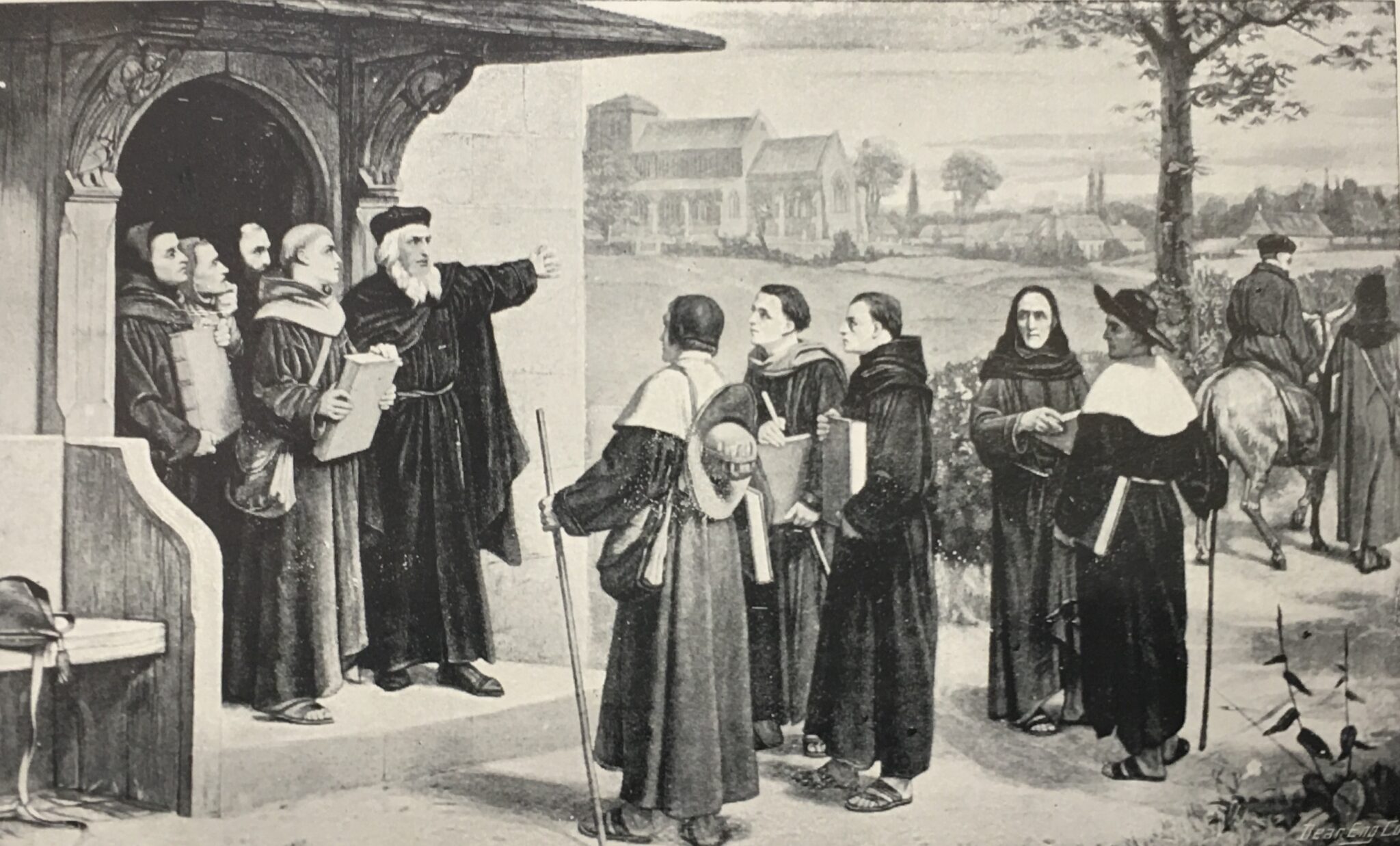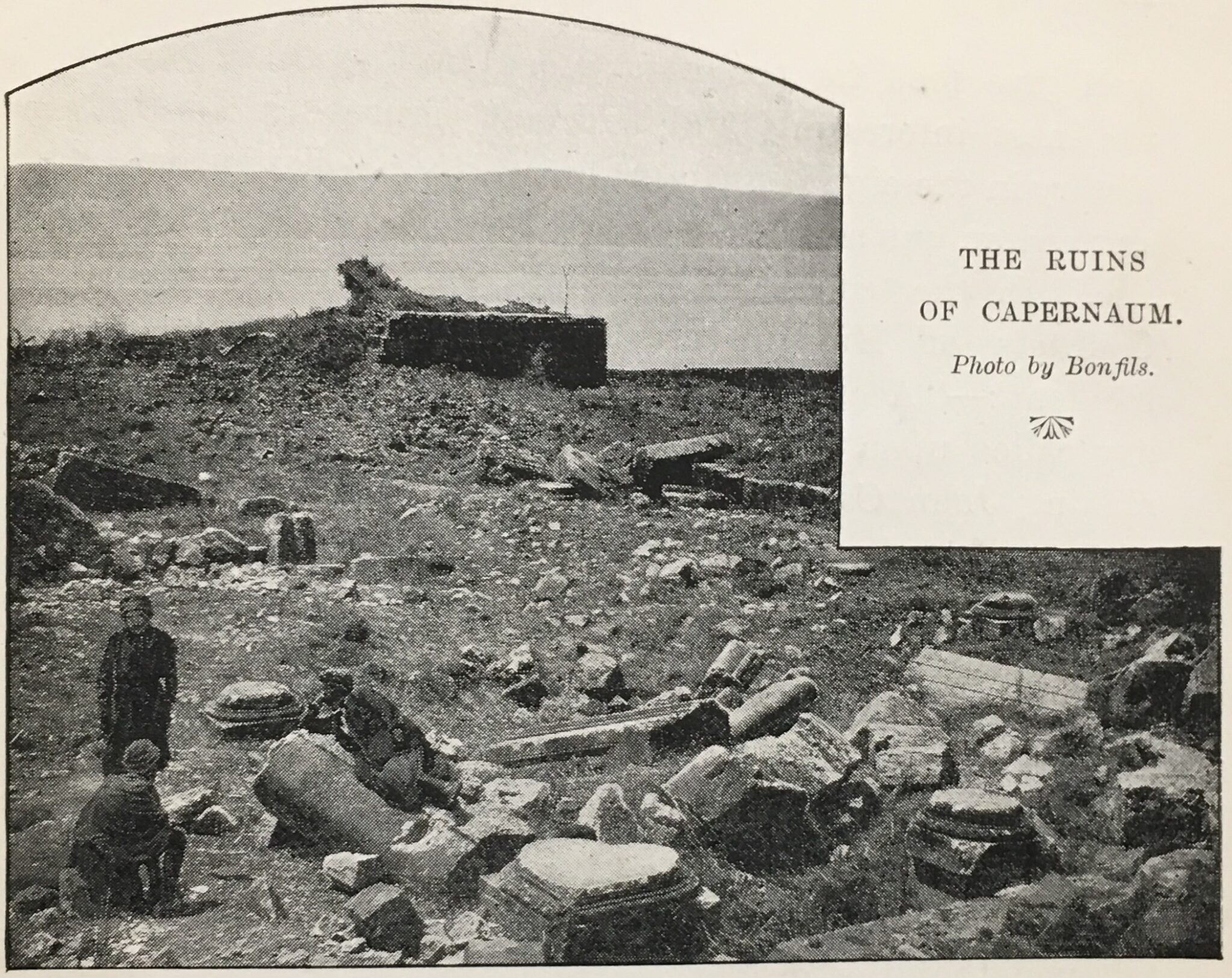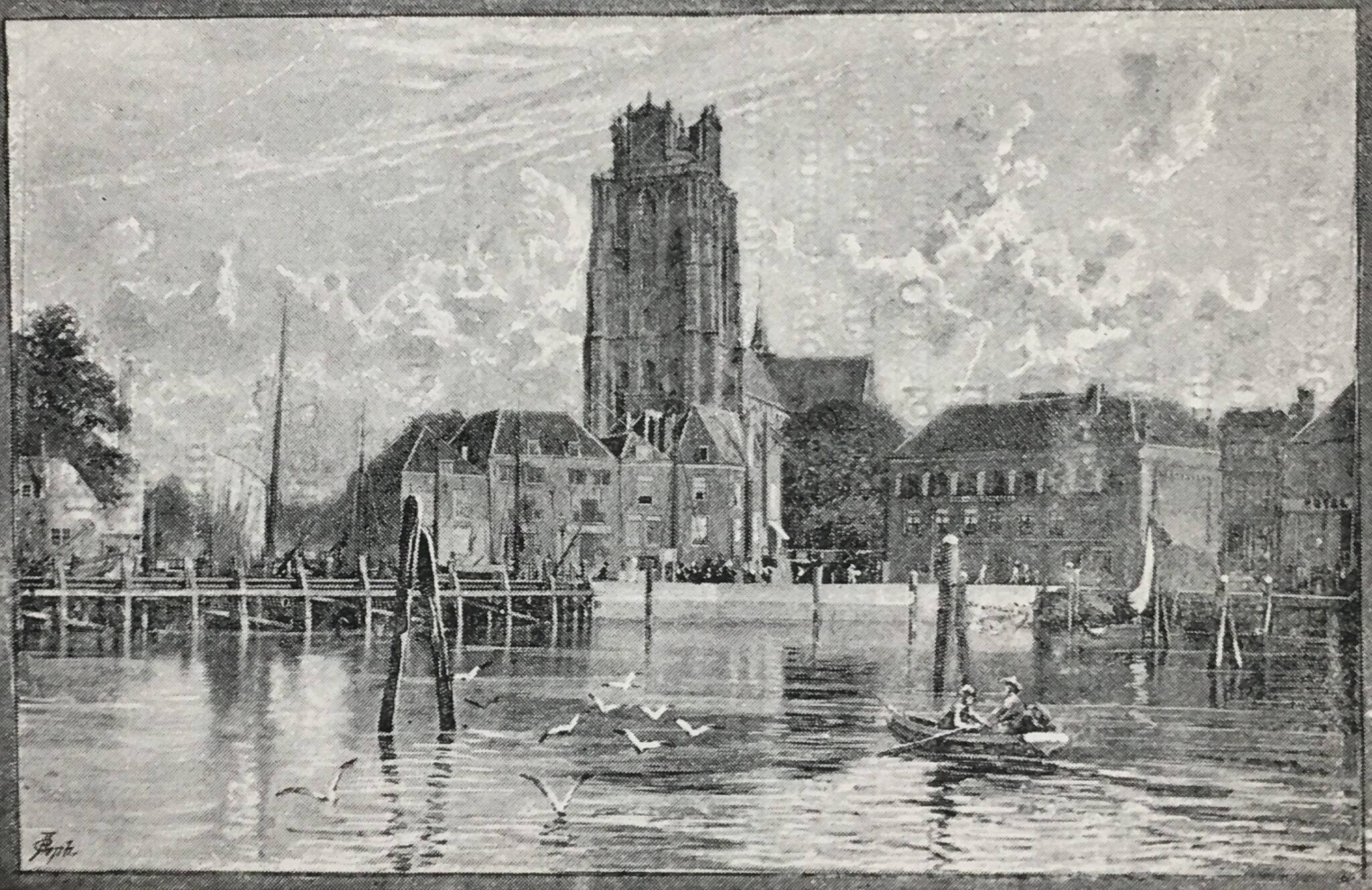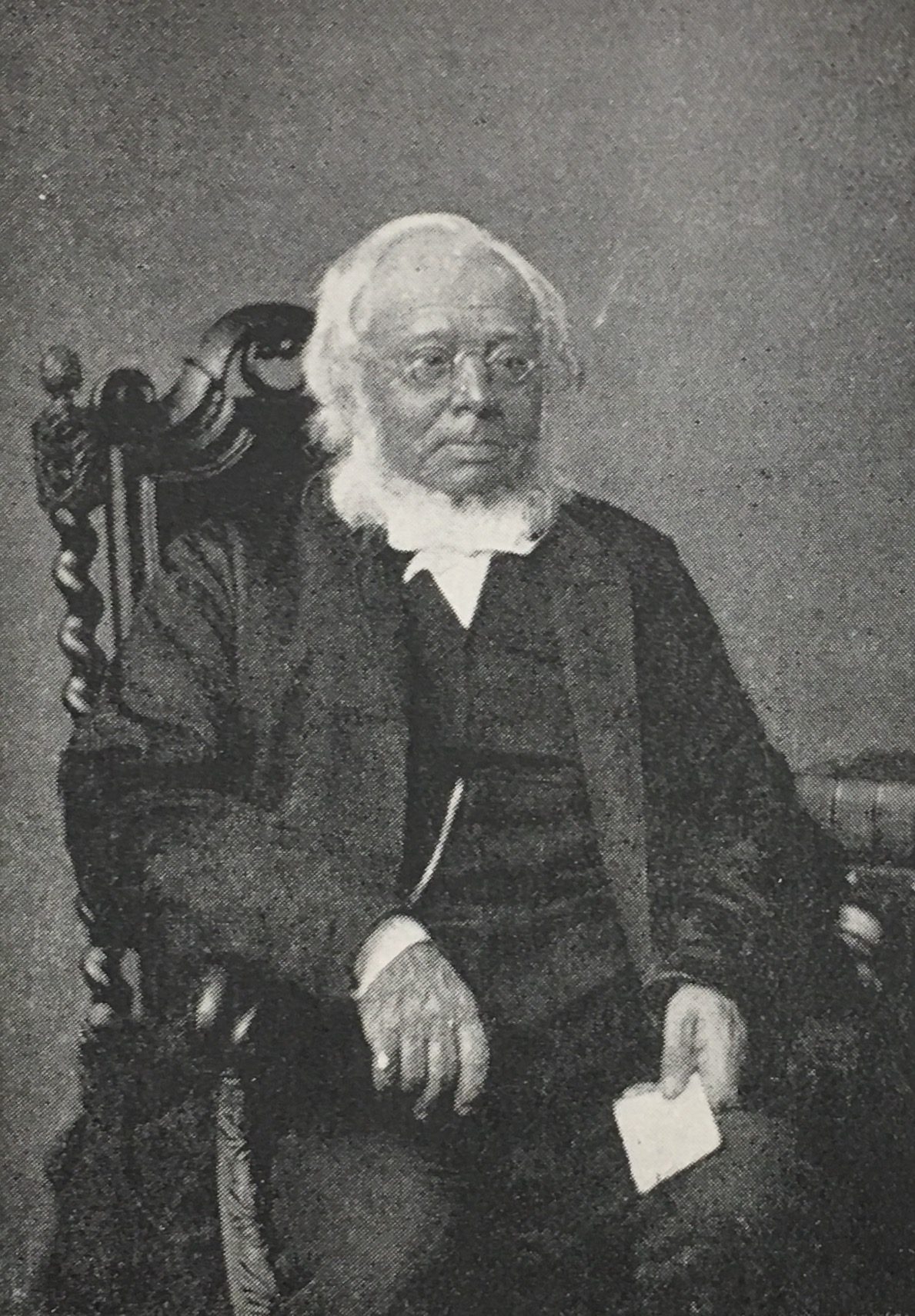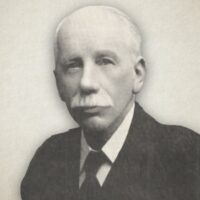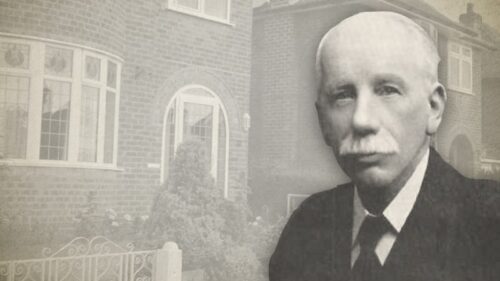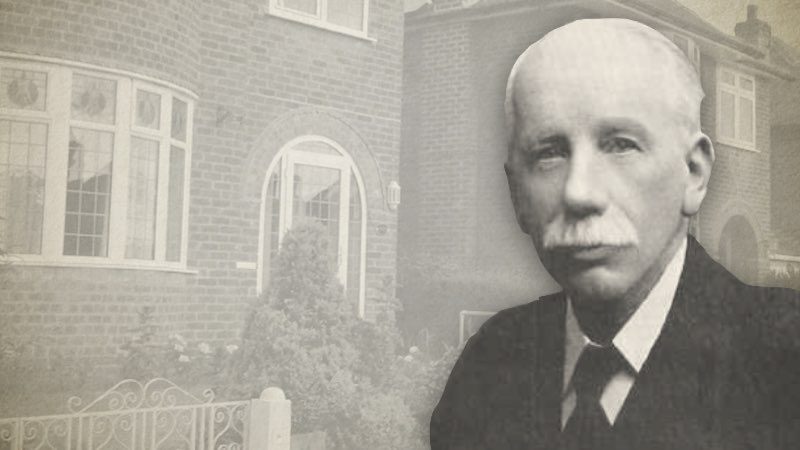
Chapter 1: Sovereign Grace
“The Dawn of the Reformation”
John Wycliff Sending Out A Band Of His Poor Preachers
“For by grace are ye saved through faith; and that not of yourselves: it is the gift of God: not of works, lest any man should boast.”—Ephesians 2:8,9
In the crowded synagogue of Capernaum the Lord Jesus Christ, addressing many who had eagerly followed Him because of His miracles, declared, “Therefore said I unto you, that no man can come unto Me, except it were given him of My Father.” Immediately the enmity to the truth of God which is latent in every unrenewed hearted was deeply stirred; for, “From that time many of His disciples went back, and walked no more with Him.” “Will ye also go away?” was the piercing question put to the twelve. “Then Simon Peter answered Him, Lord, to whom shall we go? Thou hast the words of eternal life. And we believe and are sure that Thou art the Christ, the Son of the living God” (Jn 6:65-69). The words of our Lord, “the Faithful and True Witness,” search the heart; they discriminate and divide, and their effect today is the same as when they first proceeded from His lips.
The reply of Peter, so prompt and unhesitating, sprang from Divine life in his soul, and blessed are they who, amid the confusion, controversy and increasing apostasy of our times, are enabled to affirm concerning the Person and work of God the Son, manifest in the flesh, that they “believe and are sure.” Such a declaration is by the Holy Spirit’s teaching, without which our “religion is vain,” however much it may accord with the spirit of the age and the preaching of those who “prophets of the deceit of their own heart” (Jer 23:26). In these days of blasphemy and reproach, when nature is confounded with grace and excitement with the internal witnessing of God to the redeemed sinner, let us at any cost stand fast by the truth, even that covenant salvation which shines throughout the Scriptures and is embodied in our Lord Jesus Christ, who “is the Head of the Church”—“the Saviour of the body.” Here is a system beautifully harmonious and consistent, not made by man, but in every part arranged by Jehovah Himself and rejoiced in by all the saints of the Old Dispensation as well as by those of the New. As set before us in His Word, it is plan that the salvation of the Church was planned in eternity by the TriUne Jehovah; the work gloriously executed by the Lord Jesus Christ; and is applied by the Holy Ghost to the hearts of all for whom the Saviour shed His precious blood. Toplady says: “The regenerating influence of the God’s Holy Spirit on the soul is the best door for the doctrines of grace to enter at. When they flow to us, through the channel of celestial experience, they cannot fail to throw our hearts, our tempers, and our morals, into the mould of holiness.”
A remarkable testimony from a strange quarter may well give food for thought. Lord Bolingbroke, one of the most interesting and brilliant figures in English history in the eighteenth century, and a polished speaker and writer, was accounted one of the notable deists of is age. In the course of conversation with the godly Countess of Huntington, he related the following incident:—“A clergyman of the name of Church one day called upon me, and I said, “You have caught me reading John Calvin; he was indeed a man of great parts, profound sense, and vast learning; he handles the doctrines of grace in a masterly manner.” “Doctrines of grace!” replied the clergyman; “the doctrines of grace have set all mankind by the ears.” “I am surprised to hear you say so,” said I—“you who profess to believe and preach Christianity! These doctrines are certainly the doctrines of the Bible, and, if I believed the doctrines of the Bible, I must believe them. And let seriously tell you that the greatest miracle in the world is the existence of Christianity and its continual preservation as a religion, when the preaching of it is committed to the care of such unchristian men as you.”
The most definite statement of these doctrines is embodied in “The Five Points,” agreed upon in 1618 by the Synod of Dort, in Holland, an assembly of divines of the United Provinces, assisted by deputies from the principal Reformed Churches of Europe. They are:—
1. The fall of Adam and consequent spiritual death.
2. Election and Predestination.
3. Particular and Eternal Redemption.
4. Regeneration and Effectual Calling.
5. The Final Perseverance of the Saints.
Dort
The prevailing religious fashion is to regard these truths as a geologist would look upon some fossil remains—relics of the antediluvian age. But they are spirit and life to more than seven thousand who have not bowed unto Baal, and who follow not those teachers of the day by whom the Bible is rejected as a verbally inspired Book and the only rule of faith and practice, and who thus open the sluices through which the flood of fearful error rushed in increasing volume. Others, who do not proceed so far, cloak the plain teaching of the Word, that it may be more in accordance with the taste of the age. It was a saying of Sir Richard Hill, the brother of Roland Hill, “Whenever the Gospel is so hashed and cooked up that it becomes palatable to the taste of human wisdom, it ceases to be that Gospel that Paul preached.”
The Rev. Charles Rolfe, B. A.
The late Charles Rolfe, Rector of Shadoxhurst and Orlestone, Kent, a good scholar in the school of Christ, a consistent follower of the Lamb, and a faithful champion for the truth, frequently told an anecdote of a person who went to a minister who had been offering salvation to all who chose to accept it, and said to him, “Sir, last night you offered me salvation; can you give it to me?” “No!” “Then why did you offer it? Preach the Gospel of the grace of God boldly, as you ought, without seeking to please men, and then the Holy Ghost will apply the truth to the hearts of those whom the Lord shall call.” Our omnipotent Saviour is not a suitor at the sinner’s heart, and the Lord’s servants are not sent to offer but to proclaim. This is clearly brought out in the title of an eighteenth century book by Joseph Hussey, an Independent minister of Cambridge—“Operations of Grace, but no Offers of Grace.”
Every declaration of God to the sinner is on the principle of grace and gift, not an offer, which implies there is some capability in man to make use of the benefit offered. The offer of salvation is a denial of man’s total depravity as born in the Adam fall and “dead in trespasses and sins”; it ignores the Gospel truth of the new birth and puts in its place man’s acceptance of the offer as the condition of divine life.
The truths formulated at Dort and set forth in the Westminster Confession and the Thirty-nine Articles of the Church of England, form the doctrinal basis of Calvinistic Churches, and are as old as the Bible. They have been dear to God’s witnesses in every age, who have declared with no faltering testimony that “not by works of righteousness which we have done, but according to His mercy He saved us.”
Those whose writings date from the close of apostolic days, of whom we mention Barnabas, Clement “my fellow-laborer,” Ignatius and Polycarp, give no uncertain evidence.
1. Ignatius.
Ignatius, as a friend of the Apostle John, must have known much of him, and therefore we are not surprised that in letters bearing his name, written when he was on his way to Rome to be thrown to wild beasts in the Amphitheater, he evinces absolute self-distrust, united with unshaken confidence in the stability of Divine grace and a recognition of the work of the Holy Spirit as essential for all spiritual acts; one short sentence reveals this: “Carnal men are not able to perform spiritual things.”
2. Polycarp.
Polycarp, another disciple of John, was burnt alive in about the 100th year of his age; he was probably “the angel of the Church in Smyrna,” and he also bore clear testimony to God’s electing love.
The members of his Church, in a Circular Letter, occasioned by the Martyrdom of their Pastor, observe: “They (Jews and heathens) do not know that we shall never be able to forsake Christ, Who suffered for the salvation of the whole world of them that are saved…We pray for your health and happiness, brethren, and that ye man, according to the Gospel, walk in the doctrine of Jesus Christ, together with Whom be glory ascribed to God, even our Father, and to the Holy Spirit, for saving the elect people.” Thus the truth expressed long after, in the Seventeenth Article of the Church of England, was proved in that Martyr-age: “As the godly consideration of predestination and our election in Christ is full of sweet, pleasant and unspeakable comfort to godly persons and such as feel in themselves the working of the Spirit of Christ, mortifying the works of the flesh and their earthly members and drawing up their mind to high and heavenly things, as well because it doth greatly establish and confirm their faith of eternal salvation, to be enjoyed through Christ, as because it doth fervently kindle their love towards God.”
3. Athanasius.
Athanasius, who entered into rest in the year 373, nobly defended the Scriptural doctrine of the Trinity in opposition to the prevailing Arian heresy of his day. His name should be mentioned in this review, because, if there be error as to the Person of the Lord Jesus, there is no security as to anything. The Person of Christ is the Divine center round which the Holy Ghost carries on all His operations. Question the eternal Sonship of Christ; question His Deity; question His unspotted humanity, and the floodgate is opened to a desolating tide of error. The creed which bears his name was published long after he died and its authorship is disputed, but it unquestionably expresses his teaching.
4. Augustine, of Hippo, and Many Others.
Augustine, of Hippo, in North Africa, died in 430. He was the acutest and most fearless thinker of all the Christian fathers, and, entangled though he was by many of the errors and superstitions of his day, he was evidently raised up to expose and overthrow Pelagianism, of the doctrine of human merit. His call by grace was a wonderful instance of the sovereign mercy of God. His exquisitely beautiful account of it and of his gracious mother, Monica, who had followed her prodigal from Africa to Europe, and who died as they were about to reembark at Ostia, is to be found in the 8th and 9th books of his “Confessions,” where in one place he says: “The joy of the solemn service of Thy house constraineth to tears when it is read of Thy younger son that he was dead and is alive again, and was lost and is found.” Like the Reformation, the battle of which was first fought in Luther’s heart, so the doctrines of grace, which Augustine so powerfully vindicated, were not primarily to him themes for theological discussion, but living truths, the power and unction of which he had experienced. Perhaps no man whom Christ gave to His Church, between the death of the Apostle John and the dawn of the Reformation in the sixteenth century, has exercised a more powerful influence than Augustine; he was Luther’s favorite author, and every spiritual reader of his books discerns under all encrustations the springing well of the water of life.
Intense was the spiritual darkness that in the centuries between Augustine and Luther brooded over Christendom. Wordiness and corruption were manifest, even whilst the apostles lived; but after their departure, moral and spiritual disorder rapidly increased. Persecution having failed to exterminate the light of the Gospel, Satan tried other means to weaken its power and mar its testimony. The Church became mixed with the world and soon strove after political power. Various historians, viewing the spread of nominal Christianity from different standpoints, look upon this growth as a triumph or as a disaster. Awful mischief was done by the Church assuming political power, and we view the so-called conversion of Constantine not as a triumph, but as a calamity. Theosophy and spiritualism, under the current names of that period, largely prevailed; the old Paganism, under Christian nomenclature, made awful progress, and under the rule of the Popes cast its deadly spell over Europe. Amidst all, age after age, “the long cloud of witnesses showed the same path to heaven;” by lip and pen they published the truths of distinguishing grace, the majority receiving them through an independent study of the Word of God under the illumination of the Holy Spirit.
Augustine taught more especially the doctrine of salvation by grace and Divine election; Remigius, of Lyons, in the ninth century, particular redemption; Anselm, vicarious atonement; and Luther, justification by faith. These landmarks will stand out more clearly if typical texts are selected as illustrative of the truth emphasized by each of these good men. We give those chosen by the late Dr. John Duncan:—
Augustine—“By grace are ye saved through faith, and that not of yourselves; it is the gift of God.”
Remigius—“I am the Good Shepherd; the Good Shepherd giveth His life for the sheep.”
Anselm—“Christ suffered for our sins, the just for the unjust, that He might bring us to God.”
Luther—“Knowing that a man is not justified by the works of the law, but by the faith of Jesus Christ, even we have believed in Jesus Christ, that we might be justified by the faith of Christ and not by the works of the law, for by the works of the law shall no flesh be justified.”
Calvin—“Blessed be the God and Father of our Lord Jesus Christ, who hath chosen us in Him before the foundation of the world, that we should be holy and without blame before Him in love.”
Thus the men who held aloft the beacon light, who contended earnestly for “the faith which was once for all delivered unto the saints,” and who were used of God in the salvation of sinners, were those who loved definite and discriminating truth, and history and experience tell us that nothing else can give strength and determination in opposition to error.
A religion which has not God for its Author will be modified and adjusted to suit the temper and spirit of the times. Whether it be Anselm or Bradwardine, who were Archbishops of Canterbury, or the unnamed witness among the Paulicians of the East and Waldenses of the West, there is a harmony between them all as to the way of salvation. They were heralds of the Reformation; they fanned the spark of liberty which an apostate Church would fain have extinguished; they were the missionaries and open-air preaches of those centuries, proclaiming the everlasting Gospel to hungry and thirsty souls and to worn and persecuted travelers to the heavenly city. We cherish the memory of their “work of faith and labour of love and patience of hope in our Lord Jesus Christ, in the sight of God and our Father.” May we hold fast and hold forth the blessed truths which were their joy and respond to Joseph Hart’s trumpet-call:—
“Gird thy loins up, Christian soldier;
Lo! Thy Captain calls thee out;
Let the danger make thee bolder;
War in weakness, dare in doubt.
Buckle on thy heavenly armour;
Patch up no inglorious peace;
Let thy courage wax the warmer
As thy foes and fears increase.
Bind thy golden girdle round thee—
Truth to keep thee firm and tight;
Never shall the foe confound thee
While the truth maintains thy fight.
Righteousness within thee rooted
May appear to take thy part;
But let righteousness imputed
Be the breastplate of thy heart.”
John E. Hazelton (1924) was a Strict and Particular Baptist preacher. He was the son of John Hazelton (1822-1888). He was appointed the Pastor of Streatley Hall, London. In the December 1924 Issue, the Gospel Magazine wrote of him:
“For a period of fifteen years he faithfully ministered the Word of life to the Lord's people who met in Streatley Hall, London, and these are a selection of the sermons he preached there, lovingly collected together, and printed in book form. By way of introduction there is also printed A Declaration of Faith by Mr. Hazelton. This was found amongst his papers. It has never before been published. It is full of valuable teaching of such subjects as "The Peril and Needs of Our Churches," "The Holy Scriptures," "The Everlasting Covenant," "The Church," and "The Doctrine of Grace.” Mr. Hazelton was an able preacher of the everlasting Gospel, and he loved to exalt Christ and to abase the sinner. These sermons are full of rich Gospel teaching. They tell of a full and an eternal salvation, arranged and planned in the great Covenant of grace before the foundations of the world were laid. They tell of the electing love of God the Father, the redeeming work of God the Son on behalf of His Church and people, and of the regenerating and sanctifying work of God the Holy Ghost. They tell of the blood and righteousness of the Divine Surety of the everlasting Covenant. They are marked by fulness of Gospel truth and by tender and loving words to seeking and penitent sinners. They display a considerable knowledge and much care in preparation. They are the words of a true man of God who in dependence on the aid of the Divine Spirit earnestly proclaimed the Gospel of Divine grace in the prayerful hope that God the Holy Ghost would use the message as the means of regenerating the sinful objects of His eternal mercy. Space will not allow us to quote from these pages, but we strongly advise our readers at once to get the book and make it point of reading one of the sermons every week. Mr. Hazelton was called home on May 8th last. His last sermons were preached on April 6th and 13th, and they form the concluding sermons of this volume. A beautiful portrait of the beloved author forms the frontispiece. By these sermons, and by his valuable Declaration of Faith, he being dead, yet speaketh.”
John E. Hazelton Sermons
John E. Hazelton's "Hold-Fast" (Complete)
John E. Hazelton's Declaration Of Faith (Complete)



